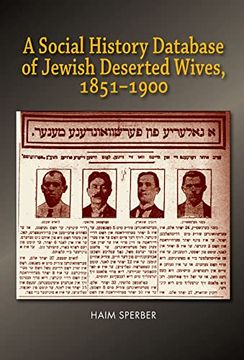Compartir
A Social History Database of East European Jewish Deserted Wives, 1851-1900 (en Inglés)
Haim Sperber
(Autor)
·
Liverpool University Press
· Tapa Blanda
A Social History Database of East European Jewish Deserted Wives, 1851-1900 (en Inglés) - Sperber, Haim
$ 78.95
$ 107.14
Ahorras: $ 28.20
Elige la lista en la que quieres agregar tu producto o crea una nueva lista
✓ Producto agregado correctamente a la lista de deseos.
Ir a Mis ListasSe enviará desde nuestra bodega entre el
Lunes 27 de Mayo y el
Martes 28 de Mayo.
Lo recibirás en cualquier lugar de Estados Unidos entre 1 y 3 días hábiles luego del envío.
Reseña del libro "A Social History Database of East European Jewish Deserted Wives, 1851-1900 (en Inglés)"
The Database is a companion volume to The Plight of Jewish Deserted Wives, 18511900 (978-1-78976-168-9). It comprises circa 5000 entries, providing name, date and circumstance, with extensive cross-reference to aid future researchers. Agunot (Agunah, sing., meaning anchored in Hebrew) is a Jewish term describing women who cannot remarry because their husband has disappeared. According to Jewish law (Halacha) a woman can get out of the marriage only if the husband releases her by granting a divorce writ (Get), if he dies, or if his whereabouts is not known. Women whose husbands cannot be located, and who have not been granted a Get, are considered Agunot. The Agunah phenomenon was of major concern in East European Jewry and much referred to in Hebrew and Yiddish media and fiction. Most nineteenth-century Agunot cases came from Eastern Europe, where most Jews resided (twentieth-century Agunot were primarily in North America, and will be the subject of a forthcoming book). Seven variations of Agunot have been identified: Deserted wives; women who refused to receive, or were not granted, a Get; widowed women whose brothers-in-law refused to grant them permission to marry someone else (Halitza); women whose husbands remains were not found; improperly or incorrectly written Gets; women whose husbands became mentally ill and were not competent to grant a Get; women refused a Get by husbands who had converted to Christianity or Islam.

